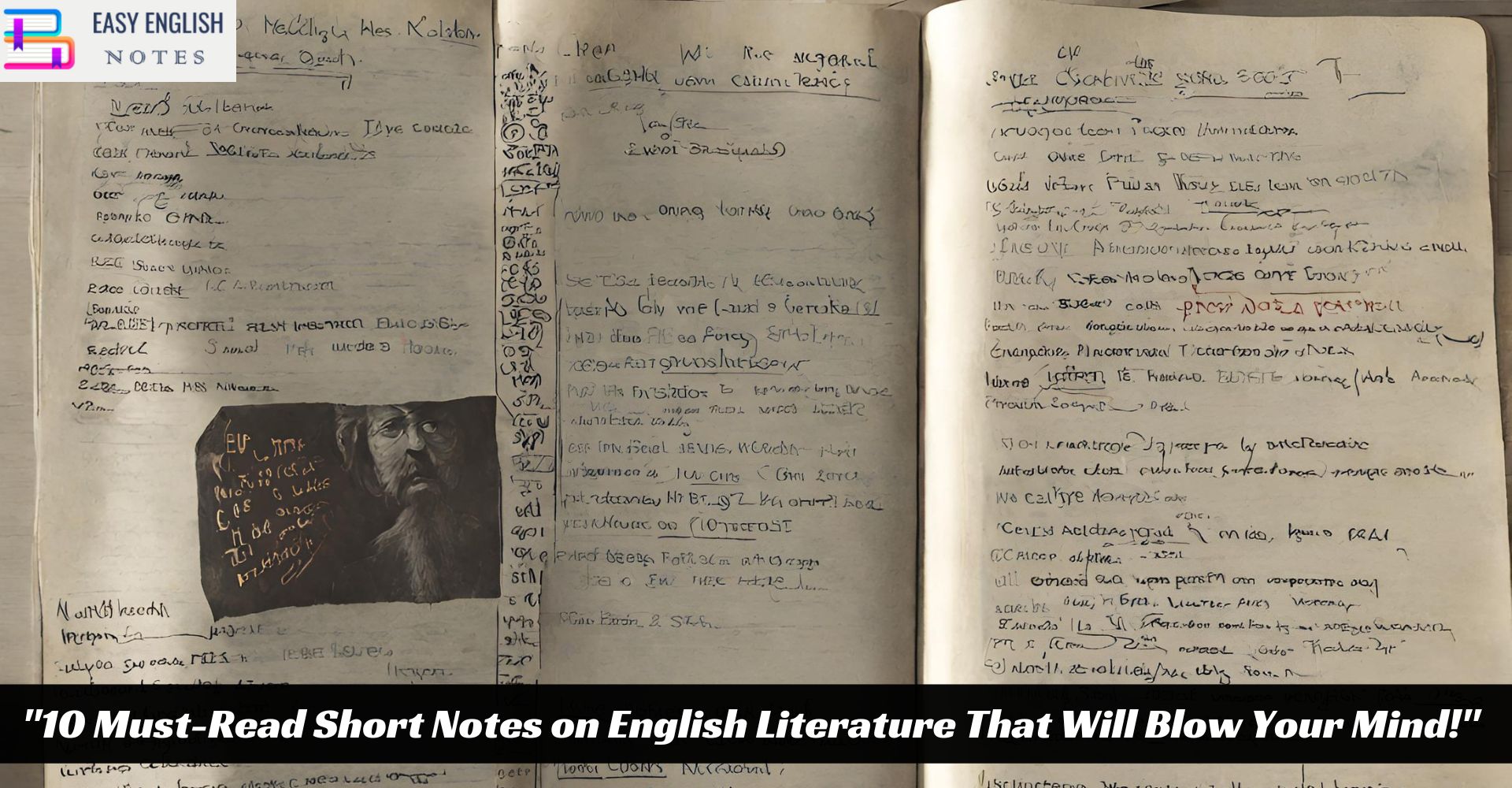Imagine uncovering a treasure trove that transforms the way you view literature. That’s exactly what we’ve got for you today! Our list of “10 Must-Read Short Notes on English Literature” is designed to do just that – blow your mind with insights and perspectives you’ve never considered before. These aren’t just any notes; they’re gateways to deeper understanding and appreciation of literary masterpieces. From the timeless works of Shakespeare to the thought-provoking narratives of modern authors, these short notes on English literature encapsulate the essence of each piece, making the complex world of literature accessible and engaging. Whether you’re a student, an educator, or simply a lover of good literature, these notes are your key to unlocking the secrets hidden within the pages of history’s most celebrated works. Ready to embark on a literary adventure that will ignite your passion for reading? Dive into these must-read notes and let the journey begin!
Embarking on a literary journey can often feel like navigating through a vast, uncharted territory. For those who love the written word, discovering “10 Must-Read Short Notes on English Literature That Will Blow Your Mind!” is akin to finding a map that leads to hidden treasures. These notes are not just summaries; they are windows into the soul of the literature, offering insights that can transform your understanding and appreciation of the works that have shaped our world.
Google Ads PPC Training Digital – membership area
An Exclusive Blood Sugar Balancing And Weight Loss
1. The Timeless Wit of Shakespeare:
Shakespeare’s works are an essential cornerstone of English literature. Our first note delves into the bard’s ingenious use of language, his profound exploration of human nature, and the timeless relevance of his plays. Whether it’s the tragic depth of “Hamlet” or the comedic twists of “A Midsummer Night’s Dream,” Shakespeare’s writings are a testament to the complexity and beauty of human life.
2. The Gothic Intrigue of “Jane Eyre”:
Charlotte Brontë’s “Jane Eyre” is more than just a novel; it’s a journey into the heart of Victorian society, feminism, and the struggle for independence. This note uncovers the layers of Gothic mystery and romance, shedding light on Jane’s revolutionary character as a heroine ahead of her time.
3. The Satirical Edge of “Gulliver’s Travels”:
Jonathan Swift’s “Gulliver’s Travels” is often mistaken for a simple adventure story. However, this note reveals the sharp satire beneath the surface, critiquing everything from politics to human nature itself. Swift’s work invites readers to reflect on the absurdities of their world, making it a must-read for any literature enthusiast.
4. The Romantic Vision of Wordsworth:
William Wordsworth’s poetry is a celebration of nature, emotion, and the human spirit. Our note on Wordsworth highlights his role in the Romantic movement, emphasizing his belief in the power of nature to heal and inspire. Through his verses, we’re reminded of the deep connection between humanity and the natural world.
5. The Tragic Complexity of “Wuthering Heights”:
Emily Brontë’s only novel, “Wuthering Heights,” is a story of passion, revenge, and the destructive nature of love. This note explores the novel’s intricate characters and setting, offering a glimpse into the dark and tumultuous world that Emily Brontë so masterfully created.
Also Read :
- Compare Hamlet with Macbeth, Othello and other Tragedies
- “The Pardoner’s Tale” is the finest tale of Chaucer
- Prologue to Canterbury Tales – (Short Ques & Ans)
- Confessional Poetry – Definition & meaning
- Line By Line Explanation Of The Poem The Eve of St. Agnes
6. The Existential Musings of “Waiting for Godot”:
Samuel Beckett’s “Waiting for Godot” is a masterpiece of the Absurdist theater, pondering life’s meaning in the face of an incomprehensible world. This note discusses the play’s themes of waiting, existential despair, and the search for purpose, resonating deeply with readers and viewers alike.
7. The Social Critique of Charles Dickens:
No list of English literature notes would be complete without mentioning Charles Dickens. Known for his vivid characters and detailed depiction of Victorian England, Dickens used his novels to critique social injustices. Our note focuses on works like “Oliver Twist” and “A Tale of Two Cities,” showcasing his storytelling prowess and deep empathy for the underprivileged.
8. The Modernist Experiment of “Ulysses”:
James Joyce’s “Ulysses” is often hailed as a cornerstone of Modernist literature. This note unpacks the novel’s complex structure, stream-of-consciousness technique, and deep allusions, illustrating Joyce’s ambition to capture the entirety of human experience in a single day.
9. The Poetic Power of Sylvia Plath:
Sylvia Plath’s poetry, marked by its raw emotion and vivid imagery, offers a haunting exploration of the self and the struggle with mental illness. This note delves into her most powerful works, highlighting her unique voice and the lasting impact of her words.
10. The Dystopian Vision of “1984”:
George Orwell’s “1984” is a chilling prophecy of a future dominated by surveillance and totalitarianism. Our final note explores the themes of freedom, truth, and resistance in Orwell’s dystopia, drawing parallels with our contemporary world and the importance of safeguarding our liberties.
Each of these short notes on English literature not only serves as a guide through the labyrinth of literary history but also as a mirror reflecting our own lives and societies. Literature, in its essence, is a dialogue between the past and the present, the writer and the reader, the imaginary and the real. By diving into these notes, we engage in that conversation, enriching our understanding of ourselves and the world around us.
So, dear reader, whether you’re a seasoned bibliophile or a curious newcomer to the world of English literature, these ten short notes are your gateway to a deeper appreciation of the literary masterpieces that continue to influence, challenge, and entertain generations of readers. Let them inspire you, provoke thought, and perhaps even blow your mind with the power and beauty of the written word.











